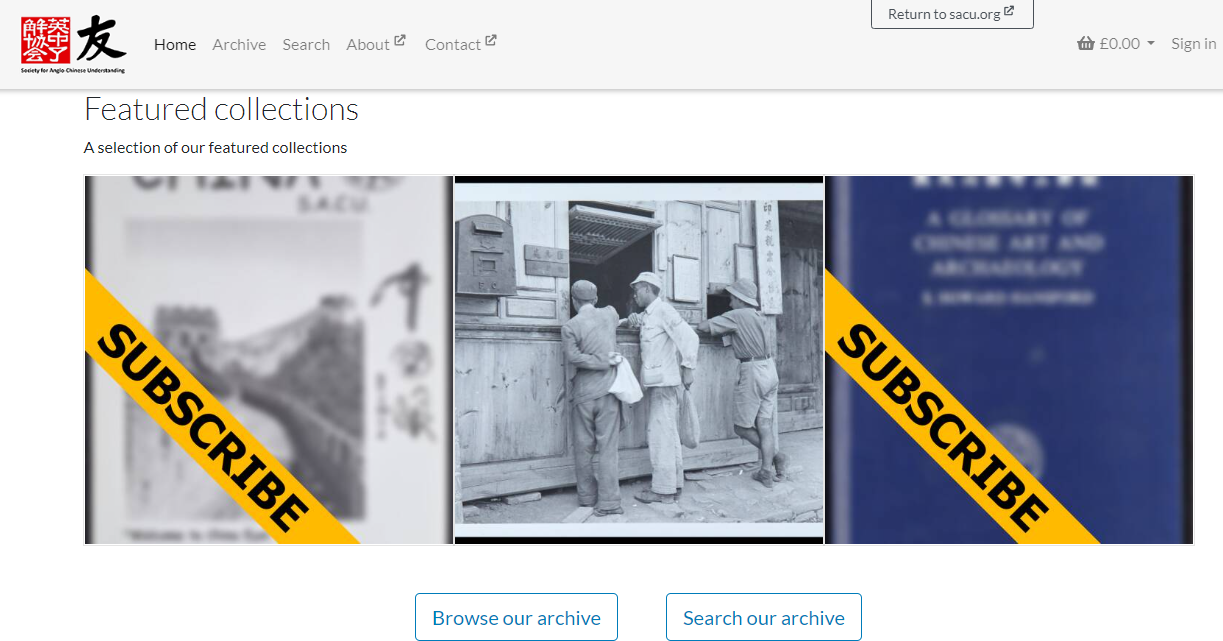Yi Xing
Renmin University of China, Master of Journalism, Class of 2014
China Daily Reporter in London
Find out more about SACU’s archive here: https://archive.sacu.org/
I learned about the Society for Anglo-Chinese Understanding from Dr Linxi Li before I came to the United Kingdom in the summer of 2022. I was in Beijing applying for my visa, and I called Linxi who had lived in the UK for six years to meet in order to find out some information about the country where I would be working for the next few years.
We decided to stroll around Jingshan Park with two friends, and while we climbed the small mountain, Linxi told me that while she was in the UK, she helped SACU to digitize its historical archives, including many old photos and records of SACU members visiting China in the 1970s to 1980s. How did the British back then view socialist China? These archives may tell a good story, I thought, so I told Linxi that when the database is made public I also want to take a look.
Time flies, and now it has been a year since I landed in London. Because of busy reporting work, I forgot about SACU but I met Keith Bennett in an interview and we became good friends. When I attended Keith’s birthday party in September, Iris Yau, who was at the same table with me, mentioned SACU when she introduced herself and sent me the latest issues of the China Eye magazine. In the magazine, I saw the name of Linxi, who is the archivist for SACU, and all that she told me on top of the Mountain Jingshan last summer came back to me. I couldn’t help but exclaim to Iris that this is such a small world, where people with the same interests will always meet each other.
Linxi then assisted me in browsing the SACU archives that are put online and sent me one academic paper she wrote based on some of the archives, How Intellectual Elites Get Involved in News Production: The Correction Practice on China-related Coverage by the Press Group of Society for Anglo-Chinese Understanding, which was published in September in one of the most authoritative journals of journalism and communication research in China. Her paper examines the various ways in which SACU members corrected biased coverage of China in the mainstream media in the UK and the United States in the 1960s.
The study mentions that Joseph Needham founded the SACU to work on the dissemination of information about all aspects of Chinese social life and thought without preconceived prejudices, dogmatic views, or ideological constraints. SACU and the Chinese People’s Association for Friendship with Foreign Countries established an exchange and cooperation program.
Since 1970, SACU started to organize China Tours, which brought hundreds of social elites and professionals to China over the next decades, and their personal experiences in China have become the exclusive materials to refute the inaccurate reports from the media. Because with up-to-date and first-hand sources, even if they could not completely convince the author, the information would make the debate more meaningful.
After reading the research paper, I felt that all history is contemporary history, and that there are striking similarities between the media’s coverage of China 60 years ago and now. Many of the British and US media are reporting China with the same bias as in the old days. In the conclusion of her paper, Linxin also writes, “Historically, British intellectual elites have effectively intervened in news generation on China issues, pushing the British public’s perceptions of China from negative stereotypes to objectivity and even friendly understanding, and this is urgently needed in today’s international communication as well”.
Comparing the situation now and 60 years ago, I found the relations between China and the UK are still tense in the political discourse, but the development of the aviation industry has made international travel easier, and the internet has lowered the threshold of communication. It would be nice if people learned a little more from history: Our enemies are not each other, but our own pride and prejudice.
历史重现
邢奕 中国人民大学2014届硕士毕业生,现中国日报驻伦敦记者
在我还没来到英国之前,我从李琳熙博士口中得知英中了解协会。那是2022年夏天,我在北京办理前往伦敦的签证,便邀曾在英国生活6年的琳熙见面,希望提前了解一些关于英国的信息。我们和另外两位朋友相约景山公园,一边爬山一边聊天。琳熙告诉我她在英国时帮助英中了解协会将许多成箱的历史档案数字化,其中有很多70、80年代英中了解协会会员来访中国的历史照片和记录。当年的英国人如何看待仍在发展初期的社会主义中国?这些旧闻会是一个很好的新闻故事。我告诉琳熙,等数据库公开了我也要去看一看。
一转眼,自我抵英已经一年多。因为琐碎的工作,我也忘了英中了解协会的事情,但因采访结识了Keith Bennett先生。九月初,我参加Keith 的生日聚会,与我同桌的丘靜雯在介绍自己时提到了英中了解协会,并发给我最近一期的《中国眼》电子杂志,在目录中我看到作为英中了解协会档案管理员的李琳熙,我不禁对丘靜雯感叹道这是一个小世界,兜兜转转,志同道合的人总会相遇。
随后,琳熙协助我浏览了目前已经上线的英中了解协会档案,并且发给我她基于部分档案撰写的论文“知识精英介入新闻生产:英中了解协会新闻小组对媒体涉华报道的勘误实践”,该文于今年9月发表在中国最权威的新闻传播研究期刊之一《新闻大学》上。这篇论文研究20世纪60年代英中了解协会成员们通过种种方式纠正欧美主流媒体对中国的偏颇报道,我一口气读完。
研究中提到李约瑟发起成立英中了解协会就是为了致力于传播有关中国社会生活和思想等各方面信息,而不存在先入为主的偏见、教条主义观点或意识形态限制。其中英中了解协会与中国人民对外友好协会建立交流合作,从1970年起开辟中国之旅,十多年间将数百名社会精英和专业人士带入中国,他们的个人亲历和访华见闻成为协会批驳媒体不实报道的独家材料。因为用最新的一手资料让勘误内容更加精准可信,这样即便不能完全驳倒作者,也能让这种辩驳更有益。
在阅览档案资料和历史研究时,我深深感受到所有的历史都是当代史,60年前的欧美媒体对华报道的情况和现在有着惊人的相似之处,看看这些英中了解协会档案,就会发现现在很多英美媒体对中国的报道依旧带着一副旧日的偏见。琳熙在论文结语写道:“历史上的英国知识精英有效介入了中国议题的新闻生成,将英国民众对中国的认知从消极定见向冷静客观乃至友好理解的方向推动,当今国际传播生态亟需这样的力量。”
和60年前相比,虽然在政治语境下中英两国的关系仍然紧张,但航空业让国际旅行变得更加容易,互联网的普及更是降低了相互了解与交流的门槛。如果人们再能从历史中汲取一点教训就更好了:我们的敌人不是对方,而是自己的傲慢与偏见。

